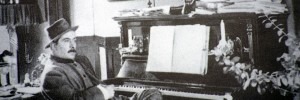 “Minors of the Majors” invites you to discover compositions by the great classical composers that for one reason or another have not reached the musical mainstream. Please enjoy, and keep listening!
“Minors of the Majors” invites you to discover compositions by the great classical composers that for one reason or another have not reached the musical mainstream. Please enjoy, and keep listening!
Giacomo Puccini (1858-1924) famously wrote, “Holy God touched me with his little finger and said to me, write for the theater; take care, write only for the theater.” He certainly appeared to have reinforced the stereotype that an Italian composer was destined to uniquely compose for the musical theatre. “There cannot be but two genres of music; symphonic and operatic,” his compatriot Pietro Mascagni wrote, “All others emanate directly from these two, which are like the roots whence every other musical genre blossoms.” As a composer of unforgettable melodies, Puccini’s musical and dramatic style has long endured intense scholarly criticism. He has been accused of blatant populism, and at the same time neglecting the dramatic necessities of the libretto. Lloyd Schwartz harshly suggests, “Puccini made a major career from combining sincerity of intention with shameless manipulation of the listener.” Despite all the scholarly groaning “Puccini has been called the “greatest composer of Italian opera after Verdi.”
Yet young Puccini, like almost every other students of music, could not avoid the piano. Once enrolled at the Pacini School of Music in Lucca, Puccini reports his daily activities in his diary. “In the morning I get up at 8:30. When I have a lesson I go to it. If I have no lesson I practice the piano a little. A little does me, but I do need to practice…From three to five it’s back to the piano to read through a bit of classical music. Actually I’d like to take out a subscription for scores, but this costs quite a few pence.” These early years also saw the composition of a few academic pieces for piano, and more significantly, a number of compositional exercises that eventually became part of his first opera, Le Villi.” But on the whole, Puccini’s piano compositions are few and far between. His last work for the piano was written in 1916, and it was dedicated to benefit the families of the victims of the Great War. Contemplative and melancholy, this short work is based on a two-measure motif that quietly transposes.
Puccini: Pezzo per pianoforte
You May Also Like
- Minors of the Majors
Richard Wagner: Piano Sonata in A Major, Op. 4 Richard Wagner was one of the most important and controversial figures in the history of nineteenth-century music. - Minors of the Majors
Niccolò Paganini: Concertino for Horn, Bassoon and Orchestra, MS 65 Niccolò Paganini (1782-1840) is customarily credited with representing the pinnacle of violin technique. - Minors of the Majors
George Gershwin: Lullaby for Strings George Gershwin was the son of seriously poor Jewish immigrants! - Minors of the Majors
Georg Philipp Telemann: Overture in A minor, TWV 55:a1 In 1723, the city council of Leipzig was looking to fill the position of the director of music
More Anecdotes
- Bach Babies in Music
Regina Susanna Bach (1742-1809) Learn about Bach's youngest surviving child - Bach Babies in Music
Johanna Carolina Bach (1737-81) Discover how family and crisis intersected in Bach's world - Bach Babies in Music
Johann Christian Bach (1735-1782) From Soho to the royal court: Johann Christian Bach's London success story - A Tour of Boston, 1924
Vernon Duke’s Homage to Boston Listen to pianist Scott Dunn bring this musical postcard to life
